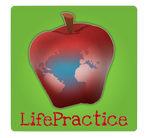cross-posted from www.GingerLewman.com
The students in grades 5-8 gathered in the lunchroom as the teacher tested the Skype connection with Christopher Orwoll, the CEO of theKansas Cosmosphere and Space Center. Students were quietly gathering their food, choosing tables, and clutching their already-prepared questions in hand. This was the first-ever working lunch for many of the younger students and it was exciting!
Soon, several students were lined up, asking questions they had carefully crafted to gain the most essential information that would help them move their parts of the project forward. Mr. Orwoll was standing in front of the actual Apollo 13 capsule and was even moving the camera on his end to various angles and shots so the students could better see the Apollo 13 capsule and other actual space artifacts. Students asked about specific dimensions and functions of various items, as others snapped photos of the video conferencing event, while even others, listening intently, were quietly munching sandwiches and carrot sticks, intermittently scribbling notes for their team between nibbles and sips.
After the almost hour-long video conference, the younger students marveled that they had been looking at the actual Apollo 13, while older veteran students remembered back to other projects and other experts they had talked with during video conferences. While Mr. Orwoll’s information about the Apollo 13 was extremely helpful, it had become almost commonplace for the veteran students to be able to talk with experts in the field. For now, they were ready to run outside, stretching their legs and refreshing their brains for a few minutes before heading back to work on their model and artifacts with the newfound information.
While preparing for your LifePractice PBL project, teachers find it easier to call on other teachers who would be a useful supplement to learning. However, in the course of preparing for a project or even during the project, you will likely find yourself asking questions you don’t know the answers to. Or you might find that your students are asking questions that are really smart questions that deserve answers, but despite their best work and your help, you just don’t have the right answers for them. So should you drop those questions and concentrate on only the ones that you and your colleagues can address?
Of course not.
In addition to in-house educator experts, strongly consider who else in your local and online communities (Professional Learning Networks), such as Facebook, Twitter, Google+, Plurk, might be able to serve as a content or skill expert beyond the school-based context. As you need these experts, call on them to assist the students with the learning.
Likewise, you might decide call upon outside expertise during the preparation of the project. Using experts during The Prep phase helps to ensure that high-quality, rigorous learning is being embedded at each step of the expectations. These specialists may be available to come to your room to share their knowledge with you and your students, or you may need to connect with them via email, phone conference, or video conference, like these students did with Mr. Orwoll of the Kansas Cosmosphere. If a personal meeting is not available, consider using a video conferencing tool, such as Skype, when possible. The combination of visual and auditory connection allows for learners of all ages to have an experience that is very similar to the f2f relationship. In fact, with a little practice, it can become as natural as opening up a virtual “window” on your wall to talk with someone who is just on the other side.
Suggestions for working with non-education experts
As you're gathering names for your “library of experts” that your students are able to call upon for their projects, it is good to remember that many experts will often lead with information, doling it out to students in very large and highly detailed portions. It is your job to help the expert understand the levels of learning and skill in your classroom. Also, this is the prime time to let them know that "empowerment through inquiry" is at the core of the work for your students. Some experts might have a tendency to lecture at students and those will need your assistance with sharing information in portions that are appropriate for your students' ability levels.
While experts should expect to be asked for information and can volunteer some additional information beyond what students have directly asked, the best way for him/her to interact with the students is to ask questions which might cause the student to do deeper research and learning. Sometimes a student may go off to research, only to come back a while later needing to ask that same question of the expert. That's OK as long as the student has truly tried to find the information on her own.
Overall, be cautious; not all experts will be comfortable with the inquiry technique. As the teacher, it’s your job to prepare the visiting expert for this type of learning format. Visit with them ahead of time about the project and your expectations. Provide sample questions, if possible, and in the case of student-contacted experts, let him/her know you’ll be ready to intervene if needed, for any reason. Ultimately, it is your responsibility to ensure that students are gaining high quality, information that leads to deeper engagement of learning, while continuing to foster quality connections with the community. You will need to take the necessary steps to make that connection a lasting and positive interaction for both your visitor and your students.
And don't forget the thank you note afterward!
The students in grades 5-8 gathered in the lunchroom as the teacher tested the Skype connection with Christopher Orwoll, the CEO of theKansas Cosmosphere and Space Center. Students were quietly gathering their food, choosing tables, and clutching their already-prepared questions in hand. This was the first-ever working lunch for many of the younger students and it was exciting!
Soon, several students were lined up, asking questions they had carefully crafted to gain the most essential information that would help them move their parts of the project forward. Mr. Orwoll was standing in front of the actual Apollo 13 capsule and was even moving the camera on his end to various angles and shots so the students could better see the Apollo 13 capsule and other actual space artifacts. Students asked about specific dimensions and functions of various items, as others snapped photos of the video conferencing event, while even others, listening intently, were quietly munching sandwiches and carrot sticks, intermittently scribbling notes for their team between nibbles and sips.
After the almost hour-long video conference, the younger students marveled that they had been looking at the actual Apollo 13, while older veteran students remembered back to other projects and other experts they had talked with during video conferences. While Mr. Orwoll’s information about the Apollo 13 was extremely helpful, it had become almost commonplace for the veteran students to be able to talk with experts in the field. For now, they were ready to run outside, stretching their legs and refreshing their brains for a few minutes before heading back to work on their model and artifacts with the newfound information.
While preparing for your LifePractice PBL project, teachers find it easier to call on other teachers who would be a useful supplement to learning. However, in the course of preparing for a project or even during the project, you will likely find yourself asking questions you don’t know the answers to. Or you might find that your students are asking questions that are really smart questions that deserve answers, but despite their best work and your help, you just don’t have the right answers for them. So should you drop those questions and concentrate on only the ones that you and your colleagues can address?
Of course not.
In addition to in-house educator experts, strongly consider who else in your local and online communities (Professional Learning Networks), such as Facebook, Twitter, Google+, Plurk, might be able to serve as a content or skill expert beyond the school-based context. As you need these experts, call on them to assist the students with the learning.
Likewise, you might decide call upon outside expertise during the preparation of the project. Using experts during The Prep phase helps to ensure that high-quality, rigorous learning is being embedded at each step of the expectations. These specialists may be available to come to your room to share their knowledge with you and your students, or you may need to connect with them via email, phone conference, or video conference, like these students did with Mr. Orwoll of the Kansas Cosmosphere. If a personal meeting is not available, consider using a video conferencing tool, such as Skype, when possible. The combination of visual and auditory connection allows for learners of all ages to have an experience that is very similar to the f2f relationship. In fact, with a little practice, it can become as natural as opening up a virtual “window” on your wall to talk with someone who is just on the other side.
Suggestions for working with non-education experts
As you're gathering names for your “library of experts” that your students are able to call upon for their projects, it is good to remember that many experts will often lead with information, doling it out to students in very large and highly detailed portions. It is your job to help the expert understand the levels of learning and skill in your classroom. Also, this is the prime time to let them know that "empowerment through inquiry" is at the core of the work for your students. Some experts might have a tendency to lecture at students and those will need your assistance with sharing information in portions that are appropriate for your students' ability levels.
While experts should expect to be asked for information and can volunteer some additional information beyond what students have directly asked, the best way for him/her to interact with the students is to ask questions which might cause the student to do deeper research and learning. Sometimes a student may go off to research, only to come back a while later needing to ask that same question of the expert. That's OK as long as the student has truly tried to find the information on her own.
Overall, be cautious; not all experts will be comfortable with the inquiry technique. As the teacher, it’s your job to prepare the visiting expert for this type of learning format. Visit with them ahead of time about the project and your expectations. Provide sample questions, if possible, and in the case of student-contacted experts, let him/her know you’ll be ready to intervene if needed, for any reason. Ultimately, it is your responsibility to ensure that students are gaining high quality, information that leads to deeper engagement of learning, while continuing to foster quality connections with the community. You will need to take the necessary steps to make that connection a lasting and positive interaction for both your visitor and your students.
And don't forget the thank you note afterward!


 RSS Feed
RSS Feed
